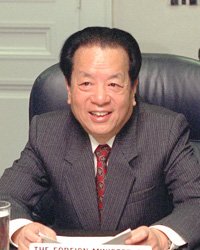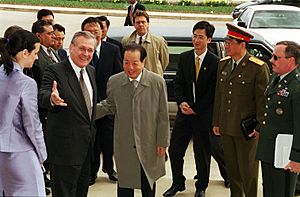Qian Qichen facts for kids
Quick facts for kids
Qian Qichen
|
|
|---|---|
|
钱其琛
|
|
 |
|
| Vice Premier of the People's Republic of China | |
| In office 25 March 1993 – 6 March 2003 |
|
| Premier | Li Peng Zhu Rongji |
| 7th Minister of Foreign Affairs | |
| In office 12 April 1988 – 18 March 1998 |
|
| Premier | Li Peng |
| Preceded by | Wu Xueqian |
| Succeeded by | Tang Jiaxuan |
| Personal details | |
| Born | 5 January 1928 British Tianjin |
| Died | 9 May 2017 (aged 89) Beijing, People's Republic of China |
| Political party | Chinese Communist Party (1942–2017) |
| Spouse | Zhou Hanqiong (周寒琼) |
| Children | 2 |
| Qian Qichen | |||||||||
|---|---|---|---|---|---|---|---|---|---|
| Traditional Chinese | 錢其琛 | ||||||||
| Simplified Chinese | 钱其琛 | ||||||||
|
|||||||||
Qian Qichen (Chinese: 钱其琛; 5 January 1928 – 9 May 2017) was a very important Chinese diplomat and politician. He was a member of the Politburo from 1992 to 2002. This is one of the most powerful groups in China. He also served as China's Foreign Minister from 1988 to 1998. After that, he became Vice Premier from 1993 to 2003.
Qian Qichen played a key role in shaping China's relationships with other countries. This happened when Jiang Zemin was the leader of the Chinese Communist Party. Qian was very important in the return of Hong Kong and Macau to China. He also helped settle a border dispute with the Soviet Union in the 1980s. This helped improve relations between China and Russia. He also worked to improve China's relations with Western countries after a difficult period in 1989.
Contents
Early Life and Career Beginnings
Qian Qichen came from a well-known family in Shanghai. He was born in Tianjin on January 5, 1928.
Joining the Communist Party
From 1942 to 1945, Qian went to high school in Shanghai. He secretly joined the Chinese Communist Party in 1942 when he was just 14 years old. From 1945 to 1949, he worked for a newspaper called Ta Kung Pao. After the establishment of the People's Republic of China in 1949, he worked for the Communist Youth League in Shanghai.
Diplomatic Training and First Roles
Qian went to the Soviet Union to study in Moscow from 1954 to 1955. After that, he worked as a diplomat in Moscow from 1955 to 1963. He held different positions in the Chinese Embassy there.
Challenges and Return to Service
During a time called the Cultural Revolution, Qian faced difficulties. He was sent to do hard labor from 1966 to 1972. After this period, he became an Ambassador to Guinea and Guinea-Bissau in Africa. In 1977, he started working at the Ministry of Foreign Affairs. He became a vice-minister from 1982 to 1988.
Key Diplomatic Achievements
Qian Qichen became the Foreign Minister in 1988. He held this important job until 1998. From 1993 until he retired in 2003, he was also a Vice Premier.
First Spokesperson for Foreign Ministry
From 1977 to 1982, Qian was in charge of the Information Department of the Foreign Ministry. He suggested creating a system where someone would speak for the ministry. He then became the first official spokesperson for the Ministry of Foreign Affairs. A spokesperson is someone who gives official statements and answers questions from the media.
Handling Major International Relations
As Foreign Minister, Qian was very important in shaping China's foreign policy. He played a key role in the return of Hong Kong and Macau to China. He also led talks with the Soviet Union in the 1980s. These talks successfully settled a border dispute. This helped improve relations between China and Russia.
He was also important in improving China's relations with Western countries. This was especially true after a difficult time in 1989. His meeting with the British Foreign Secretary John Major in July 1989 was the first contact of its kind.
Engaging with Southeast Asia
In 1991, Qian was the first Chinese diplomat to attend a meeting of ASEAN. ASEAN is a group of countries in Southeast Asia. This showed that China officially recognized ASEAN as an important organization. It also helped set up future cooperation between China and ASEAN. This led to things like the ASEAN-China Free Trade Area.
Relations with Korea
In 1992, Qian traveled to Pyongyang, North Korea. His task was to tell Kim Il-sung, North Korea's leader, that China would be starting official diplomatic relations with South Korea.
Political Roles
Qian was a member of the CCP Central Committee multiple times. He was also a member of the CCP Politburo from 1992 to 2002.
International Recognition
In 2005, Qian received the Order of the Polar Star. This is the highest award for civilians in Mongolia. He received it for his work in improving relations between China and Mongolia.
Personal Life
Qian Qichen was good at speaking Russian and English. He also understood some French. He was married to Zhou Hanqiong. They had a son and a daughter. In 2004, he wrote a book about his experiences called Ten Episodes in China's Diplomacy.
Death
Qian Qichen passed away on May 9, 2017, in Beijing. He was 89 years old. Many important leaders attended his funeral. These included Xi Jinping, who is the current leader of the Chinese Communist Party. Other former and current top leaders also attended or sent their respects. He was officially remembered as "an excellent Communist Party member" and "an outstanding diplomat."
Images for kids
See also
 In Spanish: Qian Qichen para niños
In Spanish: Qian Qichen para niños
 | Isaac Myers |
 | D. Hamilton Jackson |
 | A. Philip Randolph |



